MercoPress. South Atlantic News Agency
Tag: Nicolas Maduro
-
Thursday, January 9th 2025 - 22:08 UTC
Guyana on alert after Maduro's plans regarding Essequibo elections
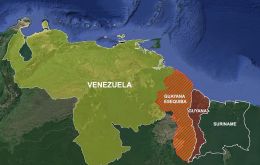
Guyanese authorities expressed their regret this week that Venezuelan leader Nicolás Maduro intends to hold elections for the position of Governor of the disputed territory of Guyana Essequiba because the move would be in violation of what was arranged between the two countries in the Dec. 14, 2023, Argyle Agreement.
-
Wednesday, January 8th 2025 - 10:55 UTC
Chavista regime abducts González Urrutia's son-in-law
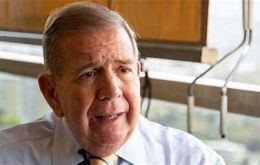
Venezuelan opposition leader Edmundo González Urrutia called off his agenda in the United States Tuesday after announcing that his son-in-law Rafael Tudares had been abducted by Nicolás Maduro's Bolivarian regime. Both Maduro and González Urrutia claim to have won the controversial July 28, 2024, elections and said they intend to be sworn in for the 2025-2031 term on Friday.
-
Tuesday, January 7th 2025 - 10:06 UTC
Maduro claims Argentine NCO targeted VP Delcy Rodríguez

Venezuelan President Nicolás Maduro claimed Monday that Argentine Border Guard (Gendarmería Nacional) First Corporal Nahuel Gallo who has been detained and charged with espionage intended to kill Executive Vice President Delcy Rodríguez. “God guard her and God has guarded her,” the Bolivarian leader stressed while insisting that Javier Milei's Libertarian administration was behind it all because it was not true that Gallo had a romantic partner and a child in Venezuela. “That gentleman has his wife in Argentina,” Maduro argued.
-
Monday, January 6th 2025 - 10:38 UTC
María Corina Machado calls for mass protests against Maduro in Venezuela
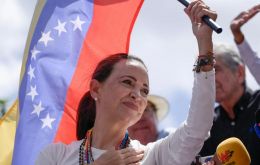
Opposition leader María Corina Machado on Sunday called for a day of demonstrations on Thursday, January 9 in Venezuela, the eve of Nicolás Maduro's swearing-in for a third term, amid allegations of electoral fraud.
-
Saturday, January 4th 2025 - 11:56 UTC
The challenge for Edmundo González, touring Argentina and Uruguay: can he avoid a new Guaidó scenario?

Venezuelan opposition leader Edmundo González Urrutia visits Montevideo this Saturday as part of a regional tour aimed at obtaining international backing to assume the Presidency of Venezuela next January 10, after declaring himself the winner of last July's elections, according to the voting tallies collected by the opposition. During his stay, he will meet with President Luis Lacalle Pou and Foreign Minister Omar Paganini, who reiterated Uruguay's support to the legitimacy of his electoral triumph.
-
Friday, January 3rd 2025 - 10:40 UTC
Milei and González Urrutia to meet at Casa Rosada
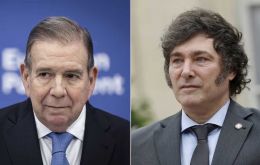
President Javier Milei will be meeting Saturday in Casa Rosada with Venezuelan opposition leader Edmundo González Urrutia, who has been recognized by many countries -including Argentina- as the legitimate winner of the controversial July 28 elections where the incumbent Nicolás Maduro was announced as victor for a new term starting on Jan. 10.
-
Friday, January 3rd 2025 - 10:26 UTC
Brazil's Ambassador to attend Maduro's inauguration
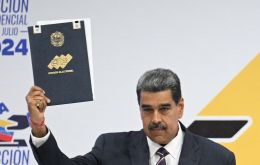
President Luiz Inácio Lula da Silva will be sending Brazil's Ambassador in Caracas to Nicolás Maduro's Jan. 10 inauguration of another six-year term in office. Once regarded as close allies and friends, Maduro and Lula do not see eye to eye after the controversial July 28 elections where the Chavista leader was declared the winner despite fraud allegations by Edmundo González Urrutia's Unitarian Democratic Platform (PUD).
-
Tuesday, December 24th 2024 - 10:50 UTC
Colombia and Mexico to be represented at Maduro's new inauguration

Authorities in Bogotá and Mexico City admitted this week that their governments will be represented in Caracas on Jan. 10 when President Nicolás Maduro takes his oath of office for a new six-year term (2025-2031)for which he was chosen in the controversial July 28 elections which the opposition also claims to have won.
-
Thursday, December 19th 2024 - 10:35 UTC
Argentina warns against all travel to Venezuela
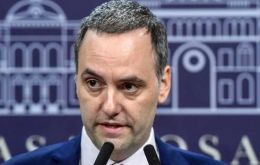
Following the detention of Border Guard (Gerndarmería Nacional) First Corporal Nahuel Gallo in Venezuela on spying charges, the Argentine Government of President Javier Milei issued a travel advisory Tuesday recommending to avoid all travel to that country where “A dictatorship prevails,” according to Presidential Spokesman Manuel Adorni.
-
Thursday, December 19th 2024 - 10:15 UTC
Venezuela renames Oil Ministry to include other fuels

The Venezuelan administration of President Nicolás Maduro renamed the Oil Ministry which will be henceforth known as Ministry of Hydrocarbons, Executive Vice President Delcy Rodríguez announced Wednesday. The measure seeks to boost the sector, she explained on her Telegram account.
